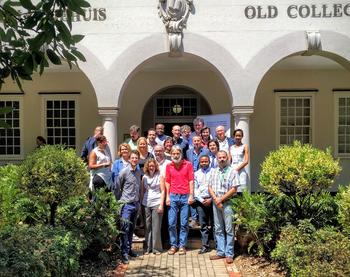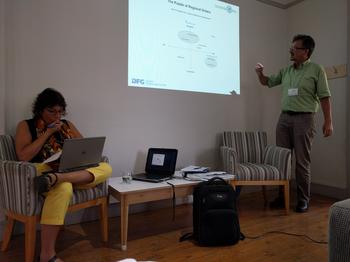Report: “Comparative Regionalism: State of the Art and Future Directions”
Nov 30, 2016
Participants of the Comparative Regionalism Conference
Image Credit: Frank Mattheis, GovInn, University of Pretoria
Tanja A. Börzel and Thomas Risse
Image Credit: Frank Mattheis, GovInn, University of Pretoria
The Oxford Handbook of Comparative Regionalism roadshow – next stop: Pretoria, South Africa. After very successful events at the National University of Singapore (NUS) in October 2015 and Pontifical Catholic University Rio de Janeiro (PUC) in April, the Kolleg-Forschergruppe “The Transformative Power of Europe” and Lorenzo Fioramonti from GovInn (University of Pretoria) co-hosted a two-day conference at the University of Pretoria. From November 3-4 2016, several Handbook authors discussed their findings with leading scholars and experts from Sub-Saharan Africa during four panels and two roundtables.
The Oxford Handbook of Comparative Regionalism roadshow – next stop: Pretoria, South Africa. After very successful events at the National University of Singapore (NUS) in October 2015 and Pontifical Catholic University Rio de Janeiro (PUC) in April 2016, the Kolleg-Forschergruppe “The Transformative Power of Europe” and Lorenzo Fioramonti from GovInn (University of Pretoria) co-hosted a two-day conference at the University of Pretoria. From November 3-4, 2016, several Handbook authors discussed their findings with leading scholars and experts from Sub-Saharan Africa during four panels and two roundtables.
The conference started with a panel on regional perspectives from Africa: Regionalism in Sub-Saharan Africa is – perhaps more than anywhere else – closely connected to major world political events, Christof Hartman from the University of Duisburg-Essen stressed. Interestingly, while it is characterized by a large number of regional organizations and relatively low levels of cross-border societal interactions, the neighboring region of North Africa is much more connected by societal ties than regional organizations, as Morton Valbjørn (Aarhus University) pointed out. The second panel continued with a discussion of two governance fields highly relevant to Sub-Saharan African countries, namely Regional Developmental Governance (Stefano Palestini, FUB Freie Universität Berlin) and Regional Migration Governance (Terri Givens, Menlo College). While we know more about the effects of governance in the field of development than in migration, this panel drew a similar conclusion to the discussions in Rio: We still know surprisingly little about both negative and positive effects of regional integration and cooperation.
Panels three and four delved into cross-cutting and overarching issues. First, Fredrik Söderbaum (University of Gothenburg) presented his chapter on the development of the scholarly field from old and new to comparative regionalism. Jeffrey Checkel (Simon Fraser University, Vancouver) took up the question of how regionalism affects the emergence and development of regional identities and communities, and vice versa. Finally, KFG directors Tanja A. Börzel (FUB) and Thomas Risse (FUB) demonstrated how theories of regional cooperation and integration (Tanja A. Börzel) and approaches of diffusion (Thomas Risse) allow us to define and analyze phenomena of comparative regionalism. In presenting the concluding chapter of the handbook, they mapped the field of comparative regionalism both as an empirical phenomenon and as a field of study.
The afternoons were spent in two informal roundtable discussions. Co-organized by the European Studies Association of Sub-Saharan Africa, the first roundtable on “Comparing regions: Europe and Africa” was chaired by Tanja A. Börzel . Oladrian Bello (Good Governance Africa, Lagos), Lorenzo Fioramonti (GovInn, University of Pretoria), Christof Hartmann (University of Duisburg-Essen), and Sofia Moreira de Sousa (EU delegation to South Africa) discussed how inter-disciplinary dialogue may be a fruitful method to address Eurocentrism in the comparative study of regionalism.
The conference closed with a roundtable on “Interregionalism as a global governance feature: beyond North-South”, with Thomas Risse (chair), Frank Mattheis (GovInn, University of Pretoria), Samuel Oloruntoba (Thabo Mbeki African Leadership Institute), Fredrik Söderbaum (University of Gothenburg), and Vanessa Tang (University of KwaZulu-Natal). The discussion moved towards scholarly challenges that accompany the rise of comparative regionalism as a field of study, such as journal publication and funding opportunities.
We wish to thank the discussants for their valuable feedback: Marianne Camerer (University of Cape Town), Samuel Oloruntoba (Thabo Mbeki African Leadership Institute), Oladiran Bello (Good Governance Africa, Lagos), Christopher Nshimbi (GovInn, University of Pretoria), Anthony Bizos (University of Pretoria), Vanessa Tang (University of KwaZulu-Natal), Malte Brosig (University of the Witwatersrand) and Karen Smith (University of Cape Town).
As a final event to this series, the KFG will host a public roundtable discussion at the representation of the European Commission to Germany with high-ranked political officials on February 15, 2017.
Luisa Linke-Behrens

